Are you considering adding a furry friend to your family? Look no further than the German Shepherd. Known for their loyalty, intelligence, and protective instincts, German Shepherds make excellent family pets. Whether you have children or live in an area with higher crime rates, these dogs are sure to become cherished members of your family.
German Shepherds have a long history of excelling in various roles, including police and military work. Their strong sense of loyalty and protective instincts make them the perfect choice for families seeking a four-legged guardian. These intelligent dogs are easily trainable and adapt well to new situations, making them the ideal companion for any family.
When it comes to family life, German Shepherds possess the ideal characteristics. They are versatile and excel in various roles, from herding to search and rescue. Their loyalty and adaptability allow them to seamlessly integrate into your family’s activities, whether it’s going for a run or enjoying a game of fetch in the backyard.
However, owning a German Shepherd requires commitment and responsibility. Before adopting one, consider your home and lifestyle to ensure that you can provide the necessary exercise, mental stimulation, and socialization that these dogs require. Busy schedules may necessitate additional help, such as dog walkers or pet sitters, to ensure your German Shepherd’s needs are met.
Overall, German Shepherds are loving, loyal, and protective companions that can bring immense joy to your family. With proper training, socialization, and consistent care, they will be by your side through thick and thin. Are you ready to unleash the truth about German Shepherds as fantastic family dogs?
Key Takeaways:
- German Shepherds are highly loyal, intelligent, and protective, making them excellent family dogs.
- They have a long history of excelling in various roles, including police and military work.
- German Shepherds are versatile and adapt well to different family lifestyles and activities.
- Owning a German Shepherd requires commitment, responsibility, and adequate resources to meet their needs.
- With proper training, socialization, and consistent care, German Shepherds can be loving and loyal family companions.
The History of German Shepherds: From Police Work to Family Companions
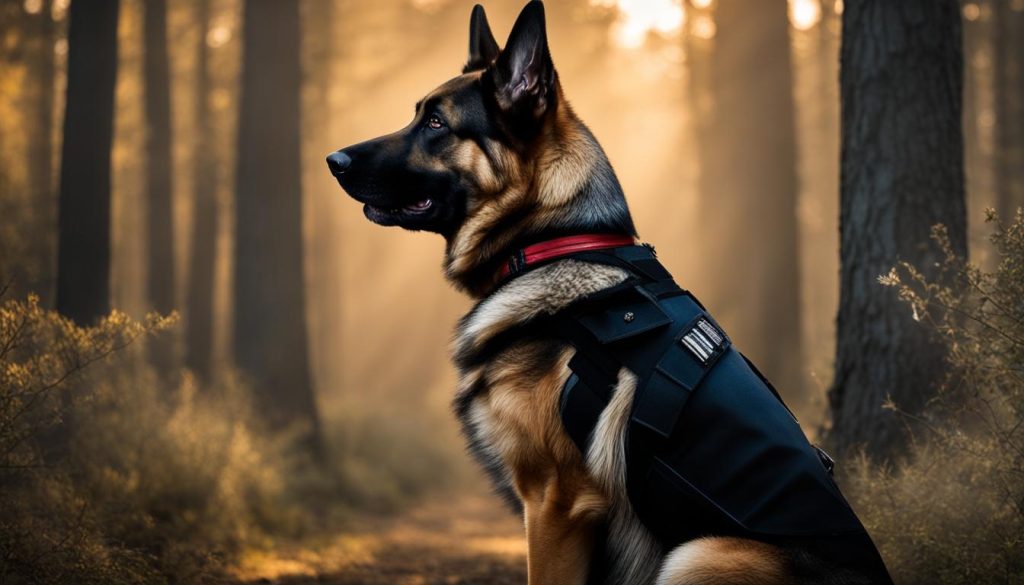
The German Shepherd breed has a rich and fascinating history. Originally developed in Germany in the late 19th century, German Shepherds were initially bred for their herding abilities. However, it wasn’t long before their intelligence and trainability caught the attention of the German military during World War I. They were utilized as messenger dogs, guard dogs, and search and rescue dogs, showcasing their exceptional skills and adaptability in various roles.
German Shepherds truly earned their reputation as versatile working dogs. Their remarkable sense of loyalty, obedience, and agility made them the perfect candidates for police and military work. Their superior tracking abilities and keen sense of smell allowed them to excel in tasks such as detecting drugs, explosives, and missing persons. Due to their reliability and precision, German Shepherds quickly became favored among law enforcement and military agencies worldwide.
However, German Shepherds’ qualities also translate well into the role of a beloved family companion. Their loyalty and protective instincts make them excellent watchdogs, ensuring the safety of their human family members. While their working background may sound intimidating, German Shepherds can be gentle, affectionate, and loving with their families. They are known for forming strong bonds with their owners and can become deeply devoted to their human pack.
The Adaptation to Family Life
What sets German Shepherds apart is their ability to adapt to different environments and lifestyles, including family life. They are known for their intelligence and trainability, making them highly responsive to proper training methods. With consistent socialization and positive reinforcement techniques, German Shepherds can become well-behaved and well-mannered family pets.
German Shepherds have an innate desire to please their owners, which makes them eager learners. They thrive when given the opportunity to engage in mental stimulation and physical exercise. Interactive activities such as obedience training, puzzle games, and outdoor exercise are essential for keeping them happy and fulfilled.
While German Shepherds can be a perfect fit for families, it’s important to remember that they require time, attention, and care. Their well-being hinges on a balanced lifestyle that includes regular exercise, mental stimulation, socialization, and a loving environment. If provided with these essential elements, German Shepherds can be loyal, loving, and exceptional family companions.
What Makes German Shepherds Ideal Family Dogs?
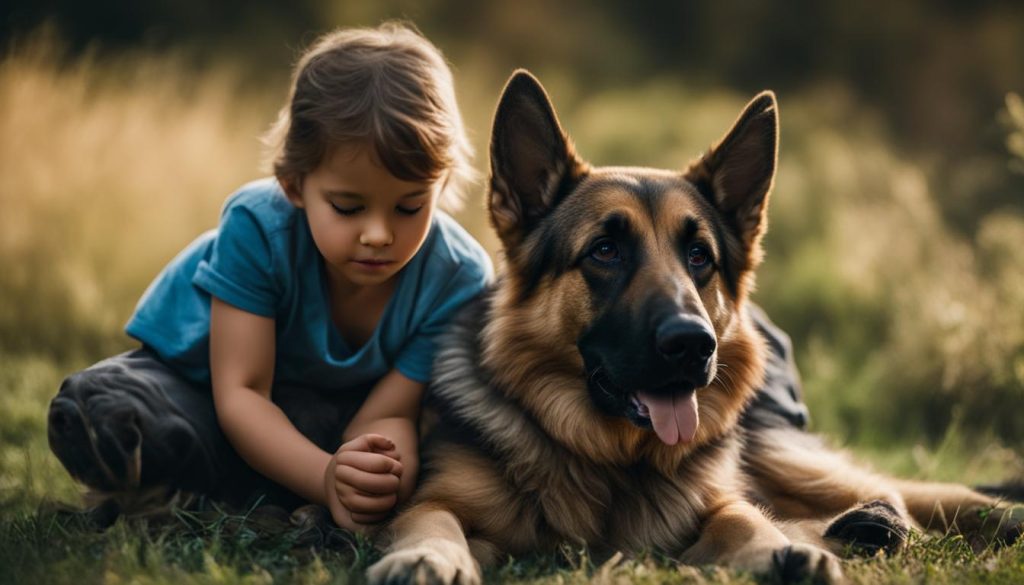
German Shepherds possess a range of traits that make them ideal family dogs. First and foremost, their loyalty is unmatched. They form strong bonds with their owners and will go to great lengths to protect their family members. This loyalty provides a sense of security and companionship for families.
Another notable trait of German Shepherds is their adaptability. They can easily adjust to various family lifestyles and activities, whether it’s going for long hikes, playing in the backyard, or simply lounging around the house. Their versatile nature allows them to be versatile companions, fitting seamlessly into different family dynamics.
Furthermore, German Shepherds are highly intelligent. This intelligence, combined with their eagerness to please, makes them highly trainable. Whether it’s basic obedience commands or more advanced tasks, German Shepherds are quick learners and excel at various training activities. This intelligence also contributes to their ability to adapt to new situations and environments.
The Versatility of German Shepherds
German Shepherds are known for their versatility in fulfilling different roles. They are often employed as working dogs in roles such as herding, police work, search and rescue, and even therapy. This versatility is a testament to their intelligence, adaptability, and loyalty. It also highlights their ability to be well-rounded and capable of taking on different tasks as needed.
To summarize, German Shepherds possess a combination of traits that make them ideal family dogs. Their loyalty, adaptability, and intelligence contribute to their ability to form strong bonds with their owners and seamlessly integrate into various family lifestyles. Whether it’s providing protection, companionship, or engaging in activities, German Shepherds have the qualities necessary to be loving and valuable members of any family.
Temperament: German Shepherds’ Loyalty, Intelligence, and Playfulness
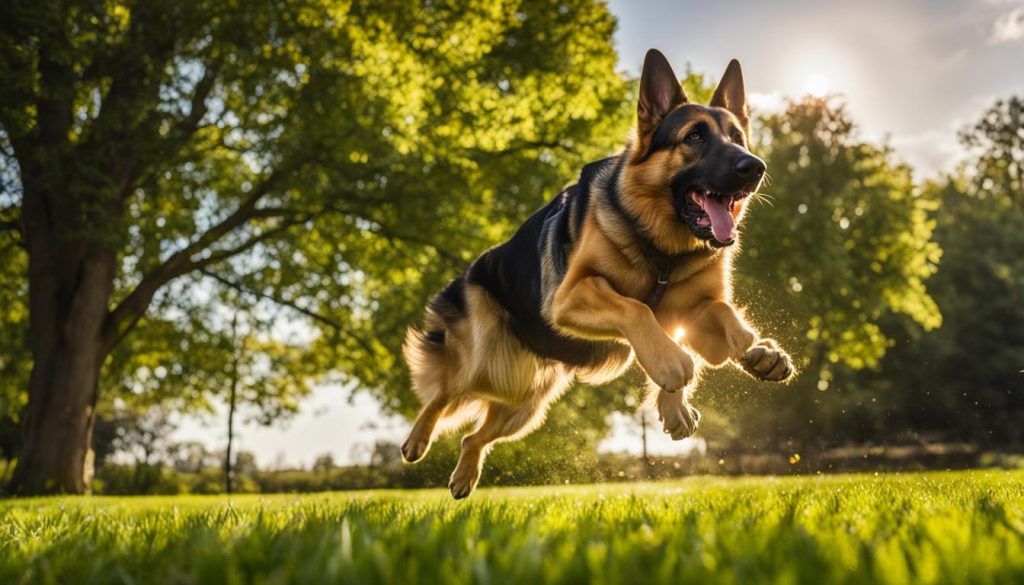
German Shepherds are renowned for their remarkable temperament, characterized by loyalty, intelligence, and playfulness. Their innate loyalty is one of their defining traits, making them fiercely devoted to their owners and family. They form strong attachments and are highly protective, making them excellent watchdogs and reliable companions.
The intelligence of German Shepherds is well-known and sets them apart from many other breeds. They are quick learners and excel in various tasks and activities. From basic obedience training to advanced tricks and jobs, German Shepherds demonstrate their high level of intelligence and problem-solving abilities. This intelligence also contributes to their adaptability and makes them versatile in different environments and situations.
While German Shepherds are known for their loyalty and intelligence, they also possess a playful and energetic nature. They enjoy engaging in activities with their family, such as playing fetch, going for walks, or participating in agility training. Their playfulness adds to their charm and makes them a joy to have around.
Loyalty
German Shepherds are renowned for their unwavering loyalty. They form deep bonds with their owners and will go to great lengths to protect and serve them. Whether it’s providing companionship, guarding the family, or even performing tasks, the loyalty of German Shepherds is unmatched.
Intelligence
The intelligence of German Shepherds is highly regarded. Their ability to quickly learn and understand commands, as well as their problem-solving skills, make them highly trainable and adaptable. This intelligence enables them to excel in various roles and activities, including search and rescue, therapy work, and competitive obedience.
Playfulness
German Shepherds have a playful and fun-loving nature. They enjoy engaging in interactive games and activities with their family. Their playful side adds joy and entertainment to the household, making them excellent companions for both children and adults.
Overall, the temperament of German Shepherds is a harmonious combination of loyalty, intelligence, and playfulness. These qualities make them ideal family dogs for those seeking a loyal and intelligent companion who can also bring joy and laughter into their lives.
Training Your German Shepherd: How to Raise a Well-Behaved Family Pet
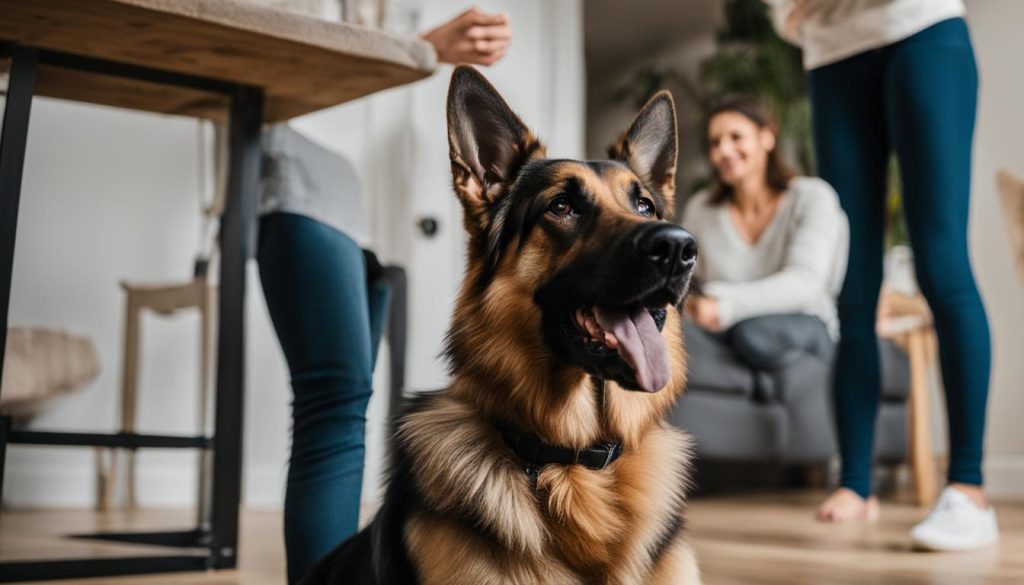
Training a German Shepherd is essential to ensure they become well-behaved family pets. Their high intelligence and energy levels require consistent training and socialization from a young age. Positive reinforcement training is highly effective for German Shepherds, as it focuses on rewarding good behavior rather than punishing negative behavior. This not only helps build a strong bond between you and your furry friend but also promotes a positive learning experience.
Socialization plays a vital role in training German Shepherds. Exposing them to various people, animals, and environments will help them become well-rounded and adaptable. It’s important to introduce them to different situations gradually, ensuring they feel safe and comfortable. Consistency is key in training German Shepherds, as they thrive on routine and clear expectations.
It’s important to remember that training a German Shepherd requires patience and dedication. They are intelligent dogs that can sometimes test boundaries. However, with positive reinforcement techniques and a firm yet gentle approach, you can effectively teach them commands, obedience, and good behavior. Establishing yourself as a strong and confident leader will earn your German Shepherd’s respect and make the training process smoother.
| Training Tips for German Shepherds |
|---|
| 1. Start training early: Begin training your German Shepherd as soon as you bring them home. This will establish good habits from the beginning. |
| 2. Use positive reinforcement: Reward your German Shepherd with treats, praise, and affection when they exhibit desired behaviors. This will motivate them to continue behaving well. |
| 3. Be consistent: Use the same commands and training techniques consistently to avoid confusion. German Shepherds thrive on routine and clear expectations. |
| 4. Socialize your German Shepherd: Expose your dog to different people, animals, and environments to ensure they are comfortable and well-adjusted in various situations. |
| 5. Be patient and persistent: Training a German Shepherd takes time and repetition. Stay patient, remain consistent, and don’t give up. |
By following these training tips and techniques, you can raise a well-behaved German Shepherd that will be a loving and loyal member of your family. Remember to always approach training with a positive mindset, creating a bond of trust and respect with your four-legged companion.
Misconceptions About German Shepherds
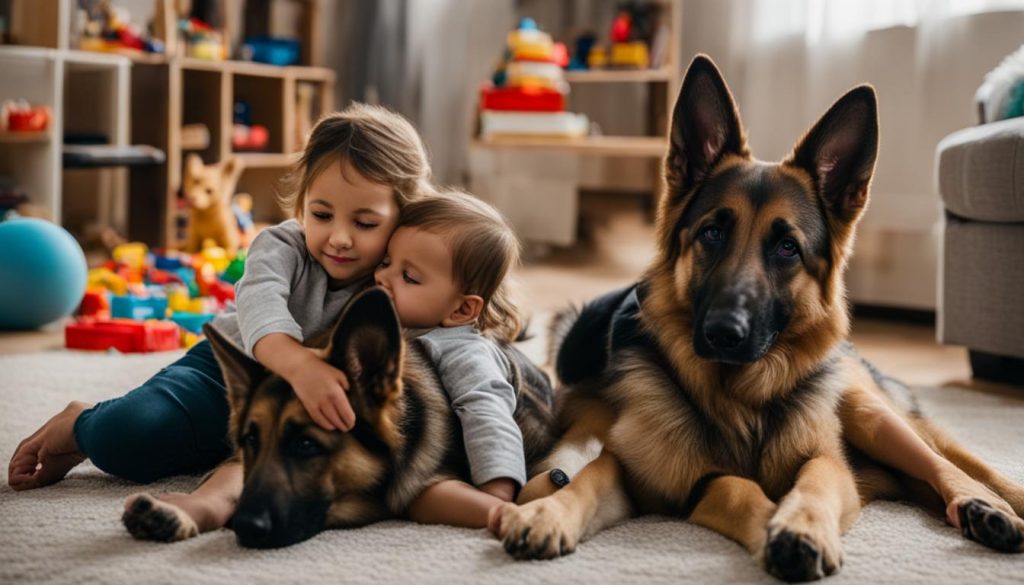
German Shepherds are often misunderstood, leading to common misconceptions about their behavior and suitability as family dogs. One of the most prevalent misconceptions is that German Shepherds are inherently aggressive. While it is true that they have protective instincts, proper training and socialization can prevent aggression and help them become well-behaved family pets. It’s important to remember that any dog, regardless of breed, can exhibit aggressive behavior if not raised and trained correctly.
Another misconception is that German Shepherds are difficult to train. While they are highly intelligent and may present training challenges due to their independent nature, they are also highly trainable with the right techniques and approach. Consistency, positive reinforcement, and patience are key to successfully training a German Shepherd. Seeking professional guidance or enrolling in obedience classes can also be beneficial in overcoming training challenges.
The suitability of German Shepherds for families with children is also a subject of misconception. Some people believe that German Shepherds are not suitable for families with young children due to their size and protective instincts. However, when properly socialized and trained, German Shepherds can be gentle and patient with children, making them great companions and protectors. As with any dog breed, it’s important to supervise interactions between children and German Shepherds and teach children how to interact with dogs respectfully.
Common Misconceptions about German Shepherds:
- German Shepherds are inherently aggressive.
- German Shepherds are difficult to train.
- German Shepherds are not suitable for families with children.
It’s important to approach the topic of German Shepherds with an open mind and to dispel these misconceptions. Every dog, including German Shepherds, is an individual with their own unique personality and disposition. With proper care, training, and socialization, German Shepherds can make loyal, loving, and well-behaved family pets.
Considerations Before Adopting a German Shepherd: Are You Ready for the Responsibility?

Before bringing a German Shepherd into your home, it’s important to consider various factors to ensure you are ready for the responsibility. German Shepherds are intelligent, active, and highly loyal dogs that require a committed owner who can meet their needs.
One of the first considerations is the amount of time and energy you can dedicate to your German Shepherd. These dogs thrive on daily exercise and mental stimulation, so be prepared to provide regular physical activity, training sessions, and interactive playtime. A sedentary or busy lifestyle may not be suitable for a German Shepherd.
The suitability of your home and living situation is also crucial. German Shepherds are large dogs that require ample space to move around comfortably. They are not well-suited for apartment living unless there are nearby parks or open spaces for exercise. A secure yard is ideal, as German Shepherds have a natural protective instinct and may become restless without proper outdoor space.
Additionally, owning a German Shepherd comes with responsibilities such as grooming, healthcare, and training. Regular grooming sessions are necessary to maintain their coat’s health and cleanliness. They may also require regular vet visits for vaccinations, check-ups, and potential medical issues. Proper training and socialization are essential, as German Shepherds are intelligent and need mental stimulation to prevent boredom or destructive behavior.
| Considerations | Responsibilities |
|---|---|
| Time and energy commitment | Regular exercise, training, and playtime |
| Suitability of home and living situation | Ample space, secure yard |
| Grooming and healthcare | Regular grooming, vet visits |
| Training and socialization | Mental stimulation, preventing destructive behavior |
“Owning a German Shepherd requires a significant commitment of time, energy, and resources. It’s important to evaluate your readiness and ensure that your home and lifestyle align with the needs of this magnificent breed.” – Professional Dog Trainer
To summarize, adopting a German Shepherd is a decision that should not be taken lightly. It’s important to assess your readiness to meet the responsibilities associated with owning this breed. Considerations such as time commitment, suitability of your home, grooming and healthcare needs, as well as proper training and socialization, must be taken into account. With the right preparation and understanding, owning a German Shepherd can be a rewarding experience, as they offer unmatched loyalty, intelligence, and companionship.
The Dangers of Resource Guarding in German Shepherds and How to Train It
Resource guarding is a natural behavior in dogs, including German Shepherds, but it can become problematic if it escalates into aggressive behavior. This behavior occurs when a dog feels threatened or when their possessions are being taken away. It’s important for dog owners to understand the dangers associated with resource guarding and how to train their German Shepherds to overcome this behavior.
Resource guarding can manifest in various ways, such as growling, snapping, or even biting when someone approaches their food, toys, or other valuable items. It’s essential to address this behavior early on to prevent any potential harm to family members or other pets.
Traditional training methods involving punishment can aggravate resource guarding behavior and escalate it further. Positive reinforcement training is recommended as a more effective approach. This involves rewarding the dog’s positive behavior and gradually getting them comfortable with giving up their resources without aggression.
| Dangers of Resource Guarding | Positive Reinforcement Training for Resource Guarding |
|---|---|
| 1. Risk of aggression towards family members and other animals. | 1. Create a positive association by rewarding the dog when they allow their possessions to be approached or touched. |
| 2. Potential for injury if the dog bites or attacks when guarding resources. | 2. Practice the “trade-up” technique, where the dog voluntarily chooses to give up their resource in exchange for something of higher value. |
| 3. Difficulty in managing the dog’s behavior and creating a harmonious household. | 3. Consult with a professional dog trainer or behaviorist who specializes in positive reinforcement training. |
“Positive reinforcement training is recommended as a more effective approach for addressing resource guarding behavior in German Shepherds.”
Training German Shepherds to overcome resource guarding requires patience, consistency, and positive reinforcement. Identifying triggers and gradually exposing the dog to the situation can help them associate positive experiences with giving up their resources. Techniques such as counterconditioning and the trade-up technique can be used to modify their behavior. It’s important to consult a professional for guidance and to practice safety measures during training.
Correcting Resource Guarding Behavior in German Shepherds using Positive Reinforcement

Resource guarding is a common behavior issue in German Shepherds, but with the right training approach, it can be corrected using positive reinforcement techniques. Resource guarding occurs when a dog displays aggressive behavior to protect their valued possessions, such as food, toys, or even their resting area. It’s essential to address this behavior early on to ensure a safe and harmonious environment for both your German Shepherd and your family.
One effective positive reinforcement technique for correcting resource guarding is counterconditioning. This involves changing your German Shepherd’s emotional response to the presence of people or other pets near their valued resources. Start by gradually desensitizing your dog to the trigger by introducing a low-value item and rewarding them with high-value treats when they exhibit calm behavior. As your German Shepherd becomes more comfortable, gradually increase the value of the items and proximity to the trigger. This process helps them associate the presence of people or other pets with positive experiences rather than a need to guard their resources.
Another technique is the trade-up technique, which involves teaching your German Shepherd that giving up a valued resource results in receiving an even better reward. Begin by offering your dog a lower-value item and then enticing them to drop it by showing them a higher-value item. When they release the first item, reward them with the higher-value item. Through consistent practice, your German Shepherd will learn that giving up their possessions leads to something better, reducing their inclination to guard.
| Positive Reinforcement Techniques for Correcting Resource Guarding |
|---|
| Counterconditioning |
| Gradually desensitize the dog to triggers |
| Reward calm behavior with high-value treats |
| Increase the value of items and proximity to the trigger |
| Trade-up Technique |
| Show a higher-value item as an incentive for your dog to drop a lower-value item |
| Reward your dog with the higher-value item when they release the first item |
Please be aware that correcting resource guarding behavior in German Shepherds requires patience, consistency, and professional guidance, especially if the behavior is severe or escalates. A professional dog trainer or behaviorist can provide expert advice tailored to your specific situation and help you develop a comprehensive training plan. Additionally, always prioritize safety during the training process to minimize the risk of any aggressive incidents.
By using positive reinforcement techniques such as counterconditioning and the trade-up technique, you can address resource guarding behavior in your German Shepherd and create a safe and harmonious environment for your entire family. Remember to be patient, consistent, and seek professional guidance when necessary. With the right approach, you can help your German Shepherd overcome resource guarding and build a stronger bond based on trust and positive reinforcement.
Wrapping Up
To summarize, German Shepherds are an excellent choice for families looking for a loyal and intelligent companion. Their protective instincts combined with their adaptability make them well-suited for family life. With the right training and socialization, German Shepherds can be loving and reliable family dogs.
It is important to remember that owning a German Shepherd comes with responsibilities. They require daily exercise, mental stimulation, and a suitable living environment. Evaluating your readiness and matching the breed’s needs with your family’s lifestyle is crucial before adopting a German Shepherd.
Despite common misconceptions, German Shepherds are not inherently aggressive. Proper training and positive reinforcement techniques can prevent behavior issues. Ultimately, with patience and consistency, German Shepherds can become loving and loyal family companions.
FAQ
Are German Shepherds good family dogs?
Yes, German Shepherds are recognized for their loyalty, intelligence, and protective instincts, making them great family pets.
What roles do German Shepherds excel in?
German Shepherds excel in various roles, including police and military work, due to their intelligence and trainability.
Why are German Shepherds ideal for families?
German Shepherds have a strong sense of loyalty and protective instincts, making them a great choice for families with children or those living in areas with higher crime rates. They are highly intelligent and trainable, adapting well to new situations.
What are the characteristics of German Shepherds as family dogs?
German Shepherds are known for their loyalty, intelligence, and playfulness. They form strong attachments to their owners and are fiercely protective of their family. They make excellent watchdogs and can be trained to perform various tasks and activities.
How should German Shepherds be trained?
Training German Shepherds is crucial to raising a well-behaved family pet. Positive reinforcement is an effective training method, rewarding good behavior instead of punishing negative behavior. Socialization is also important to expose them to various people, animals, and environments. Consistency and patience are key to successful training.
What are common misconceptions about German Shepherds?
While German Shepherds can be protective, they are not inherently aggressive. Proper training and socialization can prevent aggression. German Shepherds are highly trainable, although they may present challenges due to their intelligence. However, with the right guidance and training, they can make excellent family pets.
What should be considered before adopting a German Shepherd?
Adopting a German Shepherd requires careful consideration. They require daily exercise, mental stimulation, and socialization. They thrive in homes with sufficient space and social interaction, making apartment living less suitable. Busy lifestyles may require additional help, such as dog walkers or pet sitters. It’s important to evaluate readiness and match the breed’s needs with your family’s lifestyle.
What is resource guarding and how should it be trained in German Shepherds?
Resource guarding is a natural behavior in dogs, including German Shepherds, but it can become problematic if it escalates into aggressive behavior. Positive reinforcement training is recommended, focusing on rewarding a dog’s positive behavior and gradually getting them comfortable with giving up their resources without aggression. Consulting a professional for guidance and practicing safety measures during training is important.






